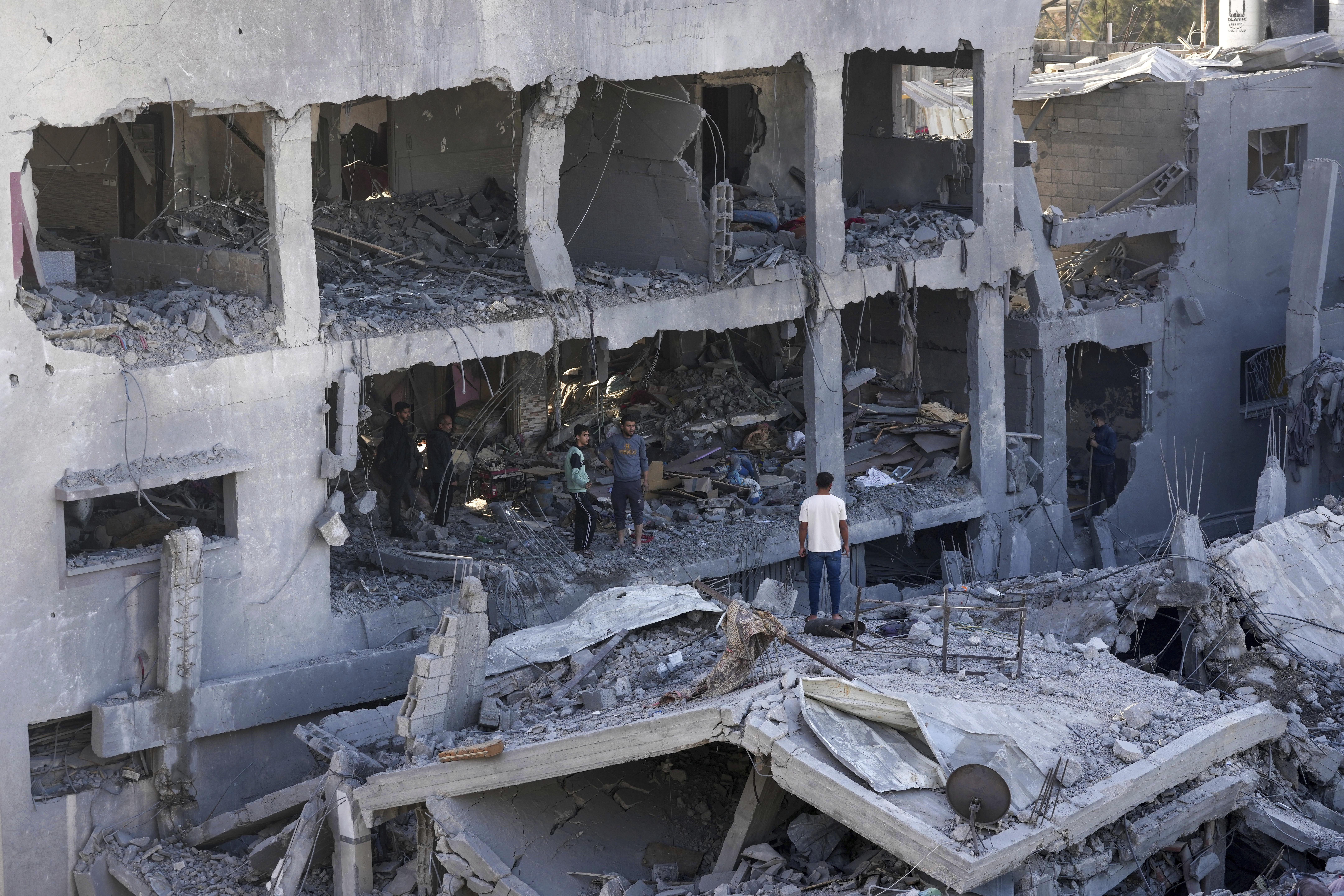Cease-fire in Israel-Palestine conflict seen as an opportunity for talks on lasting truce
 Palestinians inspect the rubble of a destroyed building in Gaza Strip, Nov 23, 2023. (PHOTO / AP)
Palestinians inspect the rubble of a destroyed building in Gaza Strip, Nov 23, 2023. (PHOTO / AP)
A four-day cease-fire agreement in Gaza between Israel and Palestinian militant group Hamas offers an opportunity for peace talks being widely pushed by the global community, analysts said.
The temporary truce, which will be accompanied by the release of some hostages held by Hamas in return for Palestinians imprisoned by Israel, marks the biggest diplomatic breakthrough since an Oct 7 attack on Israel reignited the dire Palestine-Israel conflict.
In a statement issued on Nov 22, the office of Israeli Prime Minister Benjamin Netanyahu said that Israel will free 150 Palestinian women and teenagers and allow more humanitarian aid to enter Gaza in return for 50 hostages, mostly women and children.
China has welcomed the pause in fighting and said it hopes this will help ease the humanitarian crisis in Gaza, de-escalate the conflict, and alleviate tensions in the region.
Since this round of conflict started, China has been calling for a cease-fire, and working relentlessly to de-escalate the situation, protect civilians and offer humanitarian assistance, said Foreign Ministry spokeswoman Mao Ning.
Hamas gunmen captured around 240 people from southern Israeli towns on Oct 7, according to Israeli authorities. Four hostages have been released so far, while at least 14,400 Palestinians, including women and children, have been killed in the nearly seven-week-long conflict, officials said.
According to the deal brokered by Qatar among others, 50 Israeli hostages will be released in small groups over four days, during which there will be a full pause in the fighting. The release of every 10 hostages thereafter will result in one additional day of truce.
Umer Karim, an associate fellow at the King Faisal Center for Research and Islamic Studies in Riyadh, Saudi Arabia, told China Daily that the hostage issue “is becoming a real political burden” for Netanyahu.
The Israeli leader has agreed to a temporary truce to “slow down the general momentum against Israel right now in the form of protests and demonstrations”, which is “putting some pressure on Western governments to change their stance on the matter”, Karim added.
Yu Guoqing, a researcher at the Chinese Academy of Social Sciences’ Institute of West Asia and African Studies, said the Israeli government agreed to the brief cease-fire largely because it is under pressure at home and abroad.
The Netanyahu government is under immense domestic pressure due to Israeli casualties in the conflict and the fact that hostages held by Hamas have not been released even six weeks later, Yu said.
Israel received a sympathy wave after it was attacked by Hamas but its image in the international community has shifted following the large number of civilian casualties caused by its military operation in Gaza, especially its attacks on hospitals and schools.
“The international community has already tried to restrain Israel’s military action through the multilateral framework of the United Nations. Global calls for a cease-fire actually played an important role in this brief ceasefire agreement,” Yu said.
China has also played an important role as it actively advocated for a cessation of hostilities and a cease-fire in Gaza, and consistently worked toward realizing lasting peace and sustainable security in the Middle East, the researcher said.
However, the Israeli government still believes its aim of completely defeating Hamas has not been achieved, while the brief cease-fire could be an opportunity to replenish its supply of troops and weapons and to see if Hamas is abiding by the agreement, Yu added.
Ayman Yousef, a professor of international relations at the Arab American University in Jenin in the West Bank, said the “logic at this stage” is for the global community to put some pressure on the United States to exert influence on Israel to end the conflict, which is “a matter of directly influencing events in the region”.
Haydar Oruc, a Middle East analyst and former researcher at the Center for Middle Eastern Studies in Turkiye, said the cease-fire decision, which came after 46 days of violence, could create the basis for a lasting truce in the region.
“If the US provides sincere support and puts pressure on the Netanyahu government, it will be possible to end the Israeli strikes on Gaza,” he said.
Wang Qingyun in Beijing and Xinhua contributed to this story.
Contact the writers at jan@chinadailyapac.com


